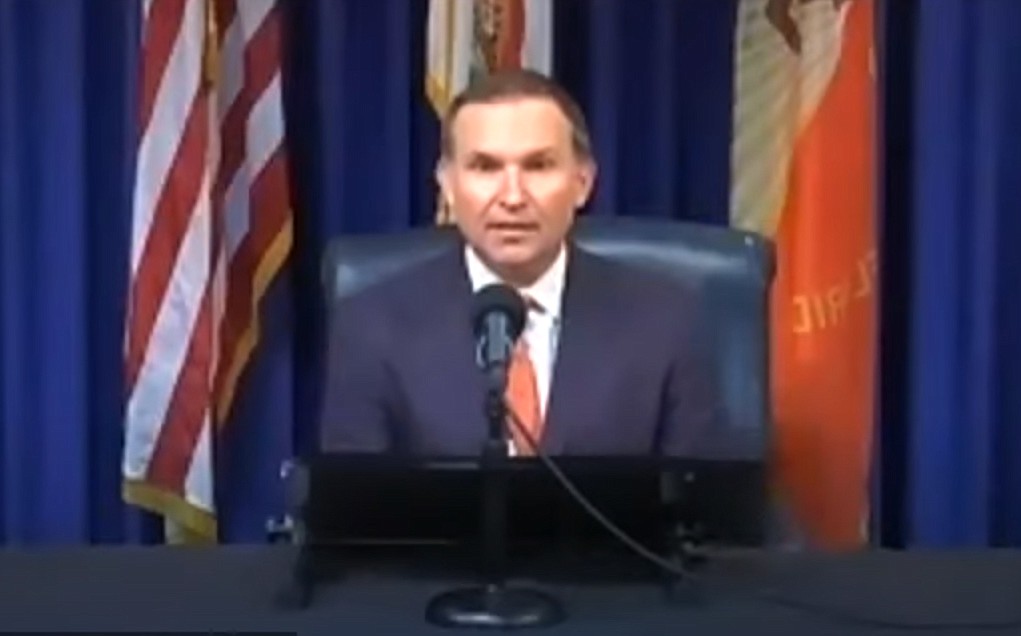
Jacksonville Mayor Lenny Curry put his support behind the City Council’s decision to add $5 million to the individual COVID-19 Rent, Mortgage and Utility Relief Program.
Council approved Ordinance 2020-243-E on May 26 to reappropriate $5 million the city received from the federal Coronavirus Aid, Relief and Economic Security Act to the $40 million individual stimulus program.
The bill, introduced by District 9 Council member Garrett Dennis, shifts the $5 million from the city’s Building Inspection Division, where it was intended to partially pay for a six-month moratorium on building permit and mobility fees.
The permit and mobility fees still will be waived but will be paid by surplus money in the division’s building fund, according to Dennis’s legislation.
Council approved nearly $10 million to pay for the fee moratorium April 27, part of a plan by the Curry administration to allocate $159 million in CARES Act money to stem job losses resulting from government-mandated COVID-19 closures.
It’s the same stimulus package used to issue $1,000 debit cards for 40,000 Duval County households.
The first version of Dennis’s bill placed the $5 million in a Council contingency fund to be appropriated as needed, but was amended by the Rules Committee to use for individual relief.
Curry said during a May 27 news conference that $31 million of the program’s initial $40 million has been distributed to eligible Duval County residents.
“I’ve heard so many stories from people in this community … where people have stopped me and shared with me that $1,000 stimulus check has gotten them through an additional month or two as they get back to work,” Curry said.
Officials offer objections
Council passed the bill 19-0 despite objection from several Curry administration officials.
According to the Council Auditor’s Office, the building inspection fund has about $17 million. City CFO Patrick “Joey” Greive told the Council on May 26 the fund is “economically sensitive.”
Greive said that before the Great Recession of 2008, the fund had a balance of $6 million to $8 million. The balance fell to the negative because of revenue losses, causing the city to loan the Building Inspection Division money from the general fund.
City Planning and Development Director Bill Killingsworth also pushed back against the bill. He and Greive argued that reducing the impact of the fee moratoriums of the building inspection fund will allow the city to maintain quick permit processing and weather expected declines in revenue because of market conditions.
“I strongly recommend we maintain a level of health that doesn’t necessitate severe cuts to service levels when things go south,” Greive said.
Deputy Council Auditor Kim Taylor said shifting the $5 million would, in a “worst-case scenario,” only bring the fund to $9.6 million by Sept. 30, after all expenditures are paid and with no additional revenue.
Curry’s Deputy Chief Administrative Officer Stephanie Burch told Council she’s not sure if the rent and mortgage relief program needs more money.
Burch said 2,100 people are on a waiting list because they didn’t get one of the initial 40,000 appointment slots. But as the program continues, she said more people are no-shows for their appointments at the Ed Ball Building and the Main Library Downtown — more than 500 people this week.
“I really do believe we can get through the entire waiting list by the end of the weekend,” Burch said.
Dennis said May 26 that more financial relief is needed in the community and he suggested administration officials readvertise enrollment to catch those who missed the initial period.
Although the vote was unanimous, Council member LeAnna Cumber said May 26 she was uncomfortable acting against the recommendation of Killingsworth and other city department heads.
Curry said more details on the expanded individual mortgage relief program, and how to enroll in Cumber’s $9 million relief program for small businesses, will be released by May 28. Cumber's program will give 4,500 qualifying businesses $2,000 debit cards.
Both the individual and business relief programs have no restrictions on how the money can be spent.
Bars, pools, and summer camps
Curry told reporters May 27 he’s in discussion with Gov. Ron DeSantis to allow bars to resume business as part of a phase two reopening strategy or a further expansion of phase one.
Establishments that make a majority of their revenue from alcohol sales were not included in DeSantis’s phase one reopening.
The mayor said he expects more announcements from the governor in the next week.
Curry said he told DeSantis bars “can open in a safe and responsible way, much like restaurants have with capacity restrictions and making sure people aren’t shoulder to shoulder, standing at a bar.”
Curry also announced May 27 that Duval County public swimming pools will begin a phased reopening June 8 at five locations, and city-sponsored youth summer camps will be held this year with social distancing and capacity restrictions.
More pools will reopen as staffing becomes available, Curry said.
A schedule of pool reopenings and summer camp guidelines and restrictions can be found here.